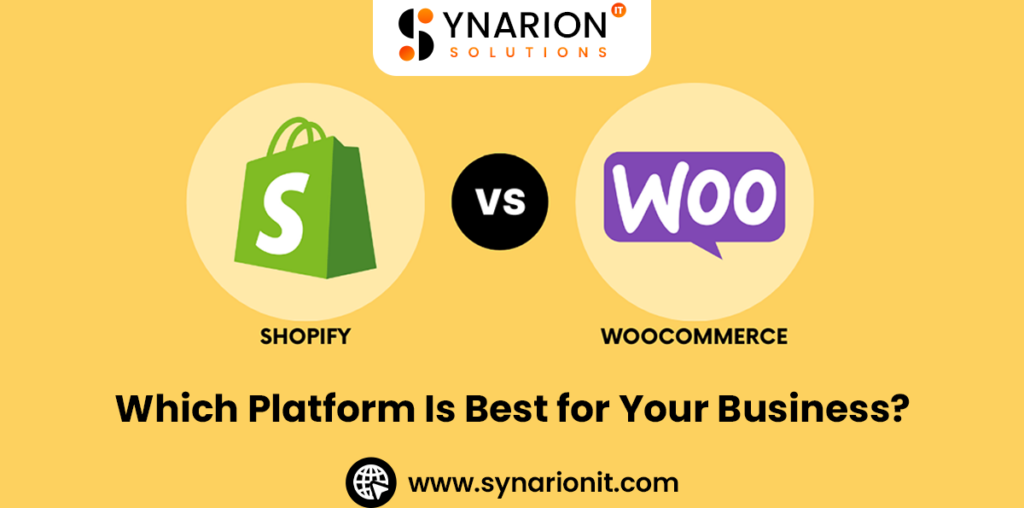When it comes to building an online store, the choice of platform is one of the most critical decisions a business owner can make. Among the most popular eCommerce platforms are Shopify and WooCommerce. Both have their advantages and unique features, but which one is the best for your business? The answer depends on various factors such as your business size, budget, technical expertise, and long-term goals.
In this blog post, we will compare Shopify and WooCommerce, exploring their features, benefits, and drawbacks to help you determine which platform is right for your business. If you’re considering these options but are unsure about the technical aspects, you can hire dedicated Shopify developers to help you make an informed decision and implement the best solution.
What is Shopify?
Shopify is a cloud-based eCommerce platform designed to make setting up, managing, and scaling an online store as easy as possible. It’s an all-in-one solution that allows you to create a fully functional eCommerce store without needing deep technical knowledge. Shopify is perfect for entrepreneurs and small to medium-sized businesses looking for a user-friendly platform with a ton of out-of-the-box features.
Some key features of Shopify:
- Ease of Use: Shopify’s drag-and-drop interface makes it incredibly user-friendly, allowing even non-technical users to set up a store quickly.
- Hosted Solution: As a fully hosted platform, Shopify takes care of hosting, security, updates, and maintenance, freeing you from technical concerns.
- Scalability: Shopify is designed to grow with your business. Whether you’re just starting or have thousands of products, Shopify can scale with you.
- Built-in Payment Gateway: Shopify provides its own payment gateway (Shopify Payments), which integrates seamlessly into your store, making it easy for customers to pay.
What is WooCommerce?
WooCommerce, on the other hand, is a plugin for WordPress that turns a WordPress site into a fully functional eCommerce store. Unlike Shopify, which is a fully hosted solution, WooCommerce is self-hosted. This means that you have more control over the customization and functionality of your store, but you’re also responsible for managing hosting, security, and other technical aspects.
Some key features of WooCommerce:
- Flexibility and Customization: WooCommerce offers more control over the design and functionality of your store. With the right technical expertise, you can customize every part of your store.
- Cost-Effective: WooCommerce itself is free, and you only pay for hosting and additional plugins, which can make it a more cost-effective option in the beginning.
- Large Plugin Ecosystem: WooCommerce integrates with a wide variety of plugins, giving you access to almost limitless functionality, from marketing tools to inventory management systems.
- Content Management: As it’s built on WordPress, WooCommerce offers excellent content management, which is ideal if you plan to run a content-heavy website alongside your store.
Shopify vs. WooCommerce: Key Differences
Let’s explore some of the key differences between Shopify and WooCommerce to help you decide which platform is right for your business.
1. Ease of Use
- Shopify: Shopify is designed to be user-friendly. Setting up a store is straightforward, with a drag-and-drop builder and easy-to-navigate options. It’s perfect for those with no technical background.
- WooCommerce: While WooCommerce integrates seamlessly with WordPress, setting up a store can be more complex. You need to manage hosting, security, and updates on your own. It’s ideal for users who are familiar with WordPress or have the technical skills to manage the store.
2. Customization and Flexibility
- Shopify: Shopify is somewhat limited in customization. While it offers a range of themes and apps, the platform is somewhat rigid when it comes to tweaking the design or functionality. However, with the help of developers, you can still make advanced customizations.
- WooCommerce: WooCommerce offers far greater customization options. Since it’s built on WordPress, you can fully customize the look, feel, and functionality of your store. This flexibility makes it ideal for businesses that need a tailored solution.
3. Cost
- Shopify: Shopify is a subscription-based service, with pricing plans ranging from $29 to $299 per month (or more for enterprise solutions). While Shopify is an all-in-one solution, the costs can add up with additional apps, themes, and transaction fees.
- WooCommerce: WooCommerce itself is free, but you’ll need to pay for hosting, domain names, SSL certificates, and premium plugins. Depending on your store’s needs, WooCommerce can be more cost-effective upfront, though ongoing costs may vary depending on the plugins and features you choose.
4. Support and Maintenance
- Shopify: One of the main benefits of Shopify is its built-in support. The platform offers 24/7 customer support, and because it’s a fully hosted solution, you don’t have to worry about updates, security patches, or server maintenance.
- WooCommerce: With WooCommerce, the support is more fragmented. You’ll need to rely on WordPress support, plugin developers, and third-party forums for help. Additionally, you’re responsible for keeping your hosting, themes, and plugins up to date, which can be a bit more time-consuming.
5. Security
- Shopify: Shopify takes care of security for you. With built-in SSL encryption, PCI compliance, and frequent updates, Shopify ensures your store and customer data are secure.
- WooCommerce: Security with WooCommerce is largely your responsibility. You need to ensure that your hosting provider is secure, install SSL certificates, and keep everything up to date. While WordPress and WooCommerce are generally secure, the added responsibility can be a hassle for beginners.
6. SEO
- Shopify: Shopify offers SEO-friendly features, including customizable title tags, meta descriptions, and URL structures. However, it’s not as flexible as WooCommerce when it comes to deep SEO customizations.
- WooCommerce: WooCommerce, being built on WordPress, benefits from the platform’s robust SEO capabilities. You can easily install SEO plugins like Yoast SEO to optimize every aspect of your store.
7. Scalability
- Shopify: Shopify is built for scalability, which is one of its biggest advantages. Whether you’re running a small store or managing thousands of products, Shopify can handle it.
- WooCommerce: WooCommerce can also scale, but it requires more management as you grow. As your store gets larger, you may need to invest in better hosting or additional tools to ensure optimal performance.
Shopify vs. WooCommerce: Which Is Right for Your Business?
The choice between Shopify and WooCommerce depends on your business needs, budget, and technical expertise.
- Choose Shopify if:
- You want an all-in-one, hosted solution with minimal maintenance.
- You prefer a user-friendly platform with an intuitive setup process.
- You’re willing to pay for a subscription service in exchange for ease of use and support.
- Choose WooCommerce if:
- You already have a WordPress site or plan to run a content-heavy website alongside your store.
- You want maximum flexibility and control over the design and functionality of your store.
- You have the technical expertise to manage hosting, security, and updates, or you’re willing to hire developers for advanced customizations.
If you’re unsure which platform to choose or need help customizing your store, it’s always a good idea to hire dedicated Shopify developers who can guide you through the process and help you make the most out of your eCommerce platform.
Conclusion
Both Shopify and WooCommerce are excellent eCommerce platforms, but the right choice depends on your specific business requirements. If you want an easy-to-use, all-in-one solution with minimal technical hassle, Shopify is an excellent option. On the other hand, if you need more control over your store’s customization and are comfortable managing the technical aspects, WooCommerce might be the best fit.
Regardless of which platform you choose, hiring Shopify developers ensures that you have the right expertise to build a successful, scalable online store that meets your business goals.




